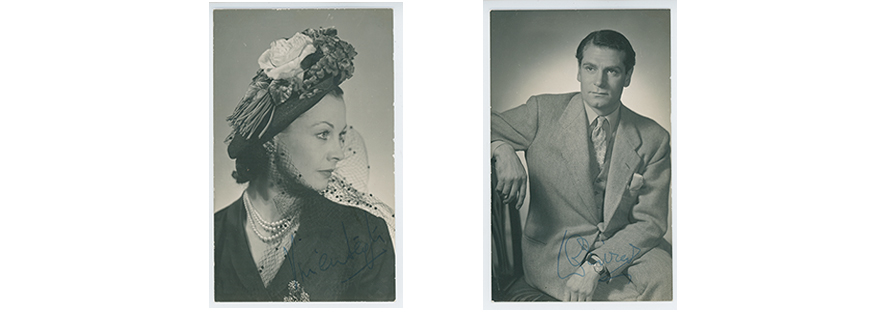
Almost ...
Zoë and her grandmother sat on the soft leather couch. Heads together, they pored over the old album, the mantle of family folklore passing from one generation to another.
“Who are they, Nanna?” asked Zoë, pointing to two photographs, one an elegant woman in profile, the other a gentleman posing languidly on a chair.

Vivien Leigh and Sir Laurence Olivier, Melbourne, 1948
“Before I tell you,” said Nanna Patricia, “who’s your favourite movie character?”
“Hermione, of course,” Zoë replied, mad for all things Harry Potter.
“Alright then,” said Nanna. “So how would you feel if you could meet Hermione?”
“Awesome, Nanna.”
“Well, I wanted to meet those people so much,” said Nanna Patricia, pointing to the photographs, “that I played hooky to do it.”
“Hooky?”
“I skipped school and went off on an adventure without telling my parents.”
For much of her childhood, young Patricia had been a tomboy, collecting anything that moved. Spiders and caterpillars, tadpoles and yabbies, nothing in nature was beyond her fascination. But by the age of sixteen, her interest had waned. Frank Sinatra was a new favourite, although her father disapproved and threw away the crooner’s records.
Film stars, though, were quite another matter, and Patricia’s Friday night trips with her parents to the local theatre had catalysed her preoccupation. But it wasn’t until she attended an East Melbourne private girls school that her obsession became full-blown. Patricia’s English class was studying Shakespeare, and sophisticated girls simply had to feel intensely passionate about the thespians who trod the boards of London theatres. Stars of stage and screen were to be adored at every opportunity.
It was November 1947, and sixteen-year-old Patricia was scanning the newspaper for gossip about her idols.
“At last,” she exclaimed loudly as she spotted the announcement. Despite threats to cancel their tour, the Oliviers were coming to Australia in February.
Hoping her father wouldn’t notice, she quietly slipped the page from the newspaper into her schoolbag. She must show Joan post-haste.
The next morning, Patricia dressed quickly, gulped down her breakfast, and raced off to school.
Joan, the daughter of a wealthy lawyer, was well-mannered and impeccably presented, the epitome of a private schoolgirl. Except when she was with Patricia. Toilet-paper bows tied to the staffroom door, bike races along the corridors. They were always in trouble for something.
At lunch, the co-conspirators scanned the news article for more clues and quietly hatched their cheeky plan.
It was now June 1948, and the Oliviers had been in Melbourne for several weeks. Their Melbourne season at an end, they would soon be moving on to Sydney. Surrounded by other guests delicately sipping their lapsang souchong, Sir Laurence Olivier, monikered ‘Larry’ somewhat disrespectfully by his friends, stared absently across the Hotel Windsor dining-room.
Despite the demanding schedule of engagements, Larry was bored. How could one even remotely expect to function in this antipodean backwater? Endless autographs and shaking hands with minor dignitaries, then that dreadful fuss over a page‑boy giving Vivien a wilting gardenia. And the brouhaha about using Australian actors? Appalling. Yet one must endure. With England bankrupted by the War and personal finances in disarray since New York, the tour had been impossible to refuse. At least the digs were adequate, and members of the British press were sending home favourable reviews. Not these Australian newshounds. They seem more obsessed with one’s social life than one’s acting ability. Of course, Vivien was not without amusement. Off with her paramour, no doubt. But Finch does show promise, so perhaps a small role for him back in England might help Vivien return to her senses.
The girls’ plan swung into action. Afternoon classes were about to begin. Patricia and Joan put on their hats and gloves, just to make sure no prefect could pull them up for yet another uniform infraction. Once out the school gate though, off came the hats and gloves. Hoping they wouldn’t be noticed, the girls scurried off in the direction of town.
The walk from East Melbourne to Spring Street seemed an eternity. At last, however, breathless with anticipation, they entered the hushed hotel lobby and marched boldly up to the reception desk. The duty manager looked up from his register, bemused to see two somewhat dishevelled schoolgirls standing before him.
Joan spoke first. “We have been invited to afternoon tea with Sir Laurence and Lady Olivier. They are expecting us,” she said, her fingers crossed behind her back.
“Yes, that’s right,” echoed Patricia in her very poshest voice.
Of course, he had been warned not to disturb the Oliviers in their suite, but there had been no such edict about afternoon tea. Besides, those Brits needed taking down a peg or two. The manager discreetly made his way over to Sir Laurence’s table.
“Good heavens, man,” fumed Larry. “Can’t you see that tea has just been served?”
The manager moved closer lest Larry’s neighbours overhear the exchange. He quietly explained that two young ladies in the lobby claimed the Oliviers had invited them to take tea. Larry glanced through the door of the dining-room, the schoolgirls gesticulating wildly as they spotted their idol.
“No idea who they are,” thundered Larry. “Autograph hunters, no doubt. Just give them a blasted photograph, then get rid of them. And no more interruptions, or I shall be forced to speak to your superior.”
And so it was. Patricia and Joan returned home with their precious photographs. Ignoring the scolding from their parents, the girls regaled their school friends for days afterwards with the details of how they almost rubbed shoulders with theatre royalty.
As her grandmother finished the story, Zoë reached for another album, eager to hunt down more of Nanna Patricia’s adventures. There were other photographs to be worked through, more ghosts of time waiting patiently for their own exploits to be revealed.
“Who’s this, Nanna?”
